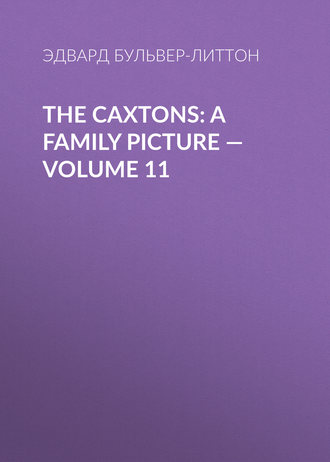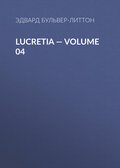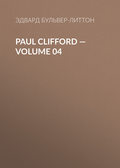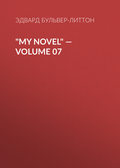
Эдвард Бульвер-Литтон
The Caxtons: A Family Picture — Volume 11
"Well, well; 'the rose by any name will smell as sweet,' as the Swan, this time at least, judiciously observes. But Mr. Vivian, too, seems to have other names at his disposal. I mean a young, dark, handsome man—or rather boy—with whom I met you in company by the roadside, one morning."
"O—h!" said Mr. Peacock, looking much relieved, "I know whom you mean, though I don't remember to have had the pleasure of seeing you before. No; I have not heard any thing of the young man lately. I wish I did know something of him. He was a 'gentleman in my own way.' Sweet Will has hit him off to a hair!—
'The courtier's, soldier's, scholar's eye, tongue, sword.'
"Such a hand with a cue! You should have seen him seek the 'bubble reputation at the cannon's mouth.' I may say," continued Mr. Peacock, emphatically, "that he was a regular trump. Trump!" he reiterated with a start, as if the word had stung him—" trump! he was a Brick!"
Then fixing his eyes on mine, dropping his arms, interlacing his fingers in the manner recorded of Talma in the celebrated "Qu'en dis-tu!" he resumed in a hollow voice, slow and distinct—
"When—saw—you—him,—young m—m—a—n—nnn?"
Finding the tables thus turned on myself, and not willing to give Mr. Peac— any clew to poor Vivian (who thus appeared, to my great satisfaction, to have finally dropped an acquaintance more versatile than reputable), I contrived, by a few evasive sentences, to keep Mr. Peac—'s curiosity at a distance till he was summoned in haste to change his attire for the domestic drama. And so we parted.
CHAPTER. VI
I hate law details as cordially as my readers can, and therefore I shall content myself with stating that Mr. Pike's management at the end, not of three days, but of two weeks, was so admirable that Uncle Jack was drawn out of prison and my father extracted from all his liabilities by a sum two thirds less than was first startlingly submitted to our indignant horror,—and that, too, in a manner that would have satisfied the conscience of the most punctilious formalist whose contribution to the national fund for an omitted payment to the Income Tax the Chancellor of the Exchequer ever had the honor to acknowledge. Still, the sum was very large in proportion to my poor father's income; and what with Jack's debts, the claims of the Anti-Publisher Society's printer, including the very expensive plates that had been so lavishly bespoken, and in great part completed, for the "History of Human Error," and, above all, the liabilities incurred on "The Capitalist;" what with the plant, as Mr. Peck technically phrased a great upas-tree of a total, branching out into types, cases, printing-presses, engines, etc., all now to be resold at a third of their value; what with advertisements and bills that had covered all the dead-walls by which rubbish might be shot, throughout the three kingdoms; what with the dues of reporters, and salaries of writers, who had been engaged for a year at least to "The Capitalist," and whose claims survived the wretch they had killed and buried; what, in short, with all that the combined ingenuity of Uncle Jack and Printer Peck could supply for the utter ruin of the Caxton family (even after all deductions, curtailments, and after all that one could extract in the way of just contribution from the least unsubstantial of those shadows called the shareholders),—my father's fortune was reduced to a sum of between seven and eight thousand pounds, which being placed at mortgage at four per cent, yielded just L372 10s. a year: enough for my father to live upon, but not enough to afford also his son Pisistratus the advantages of education at Trinity College, Cambridge. The blow fell rather upon me than my father, and my young shoulders bore it without much wincing.
This settled to our universal satisfaction, I went to pay my farewell visit to Sir Sedley Beaudesert. He had made much of me during my stay in London. I had breakfasted and dined with him pretty often; I had presented Squills to him, who no sooner set eyes upon that splendid conformation than he described his character with the nicest accuracy, as the necessary consequence of such a development for the rosy pleasures of life. We had never once retouched on the subject of Fanny's marriage, and both of us tacitly avoided even mentioning the Trevanions. But in this last visit, though he maintained the same reserve as to Fanny, he referred without scruple to her father.
"Well, my young Athenian," said he, after congratulating me on the result of the negotiations, and endeavoring again in vain to bear at least some share in my father's losses, "well, I see I cannot press this further; but at least I can press on you any little interest I may have in obtaining some appointment for yourself in one of the public offices. Trevanion could of course be more useful; but I can understand that he is not the kind of man you would like to apply to."
"Shall I own to you, my dear Sir Sedley, that I have no taste for official employment? I am too fond of my liberty. Since I have been at my uncle's old Tower, I account for half my character by the Borderer's blood that is in me. I doubt if I am meant for the life of cities; and I have odd floating notions in my head that will serve to amuse me when I get home, and may settle into schemes. And now to change the subject: may I ask what kind of person has succeeded me as Mr. Trevanion's secretary?"
"Why, he has got a broad-shouldered, stooping fellow, in spectacles and cotton stockings, who has written upon 'Rent,' I believe,—an imaginative treatise in his case, I fear, for rent is a thing he could never have received, and not often been trusted to pay. However, he is one of your political economists, and wants Trevanion to sell his pictures, as "unproductive capital.' Less mild than Pope's Narcissa, 'to make a wash,' he would certainly 'stew a child.' Besides this official secretary, Trevanion trusts, however, a good deal to a clever, good- looking young gentleman who is a great favorite with him."
"What is his name?"
"His name? Oh! Gower,—a natural son, I believe, of one of the Gower family."
Here two of Sir Sedley's fellow fine gentlemen lounged in, and my visit ended.
CHAPTER VII
"I Swear," cried my uncle, "that it shall be so." And with a big frown and a truculent air he seized the fatal instrument.
"Indeed, brother, it must not," said my father, laying one pale, scholar- like hand mildly on Captain Roland's brown, bellicose, and bony fist, and with the other, outstretched, protecting the menaced, palpitating victim.
Not a word had my uncle heard of our losses until they had been adjusted and the sum paid; for we all knew that the old Tower would have been gone —sold to some neighboring squire or jobbing attorney—at the first impetuous impulse of Uncle Roland's affectionate generosity. Austin endangered! Austin ruined!—he would never have rested till he came, cash in hand, to his deliverance. Therefore, I say, not till all was settled did I write to the Captain and tell him gayly what had chanced. And however light I made of our misfortunes, the letter brought the Captain to the red brick house the same evening on which I myself reached it, and about an hour later. My uncle had not sold the Tower, but he came prepared to carry us off to it vi et armis. We must live with him and on him, let or sell the brick house, and put out the remnant of my father's income to nurse and accumulate. And it was on finding my father's resistance stubborn, and that hitherto he had made no way, that my uncle, stepping back into the hall, in which he had left his carpet bag, etc., returned with an old oak case, and, touching a spring roller, out flew the Canton pedigree.
Out it flew, covering all the table, and undulating, Nile-like, till it had spread over books, papers, my mother's work-box, and the tea-service (for the table was large and compendious, emblematic of its owner's mind); and then, flowing on the carpet, dragged its slow length along till it was stopped by the fender.
"Now," said my uncle, solemnly, "there never have been but two causes of difference between you and me, Austin. One is over: why should the other last? Aha! I know why you hang back: you think that we may quarrel about it!"
"About what, Roland?"
"About it, I say; and I'll be d—d if we do!" cried my uncle, reddening. "And I have been thinking a great deal upon the matter, and I have no doubt you are right. So I brought the old parchment with me, and you shall see me fill up the blank just as you would have it. Now, then, you will come and live with me, and we can never quarrel any more." Thus saying, Uncle Roland looked round for pen and ink; and having found them,—not without difficulty, for they had been submerged under the overflow of the pedigree,—he was about to fill up the lacuna, or hiatus, which had given rise to such memorable controversy, with the name of "William Caxton, printer in the Sanctuary," when my father, slowly recovering his breath, and aware of his brother's purpose, intervened. It would have done your heart good to hear them, so completely, in the inconsistency of human nature, had they changed sides upon the question, —my father now all for Sir William de Caxton, the hero of Bosworth; my uncle all for the immortal printer. And in this discussion they grew animated their eyes sparkled, their voices rose,—Roland's voice deep and thunderous, Austin's sharp and piercing. Mr. Squills stopped his ears. Thus it arrived at that point, when my uncle doggedly came to the end of all argumentation,—"I swear that it shall be so;" and my father, trying the last resource of pathos, looked pleadingly into Roland's eyes, and said, with a tone soft as mercy, "Indeed, brother, it must not." Meanwhile the dry parchment crisped, creaked, and trembled in every pore of its yellow skin.
"But," said I, coming in opportunely, like the Horatian deity, "I don't see that either of you gentlemen has a right so to dispose of my ancestry. It is quite clear that a man has no possession in posterity. Posterity may possess him; but deuce a bit will he ever be the better for his great great-grandchildren!"
Squills.—"Hear, hear!"
Pisistratus (warming).—"But a man's ancestry is a positive property to him. How much, not only of acres, but of his constitution, his temper, his conduct, character, and nature, he may inherit from some progenitor ten times removed! Nay, without that progenitor would he ever have been born,—would a Squills ever have introduced him into the world, or a nurse ever have carried him upo kolpo!"
Squills.—"Hear, hear!"
Pisistratus (with dignified emotion).—"No man, therefore, has a right to rob another of a forefather, with a stroke of his pen, from any motive, howsoever amiable. In the present instance you will say, perhaps, that the ancestor in question is apocryphal,—it may be the printer, it may be the knight. Granted; but here, where history is in fault, shall a mere sentiment decide? While both are doubtful, my imagination appropriates both. At one time I can reverence industry and learning in the printer; at another, valor and devotion in the knight. This kindly doubt gives me two great forefathers; and, through them, two trains of idea that influence my conduct under different circumstances. I will not permit you, Captain Roland, to rob me of either forefather, either train of idea. Leave, then, this sacred void unfilled, unprofaned, and accept this compromise of chivalrous courtesy while my father lives with the Captain, we will believe in the printer; when away from the Captain, we will stand firm to the knight."
"Good!" cried Uncle Roland, as I paused, a little out of breath.
"And," said my mother, softly, "I do think, Austin, there is a way of settling the matter which will please all parties. It is quite sad to think that poor Roland and dear little Blanche should be all alone in the Tower; and I am sure that we should be much happier all together."
"There!" cried Roland, triumphantly. "If you are not the most obstinate, hard-hearted, unfeeling brute in the world,—which I don't take you to be,—brother Austin, after that really beautiful speech of your wife's, there is not a word to be said further."






